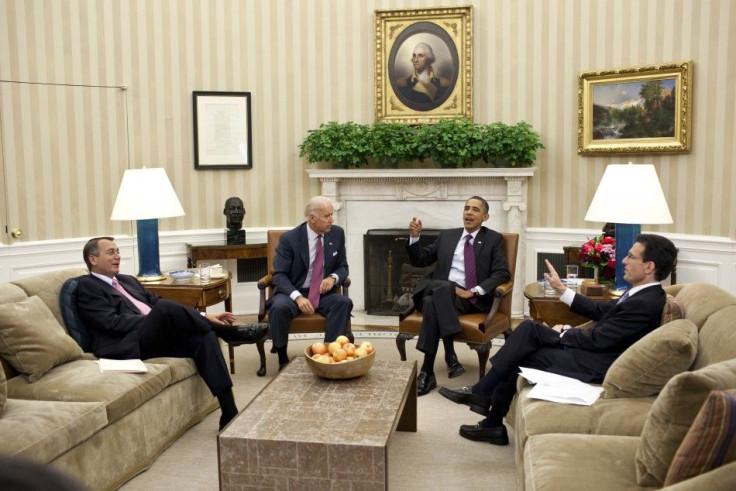Analysis: Debt debate diminishes everyone

The chaotic and often ugly debt-ceiling talks managed to avert a potential economic catastrophe but inflicted new damage to the political reputations of most of the key players.
The 11th-hour deal to raise the federal government's debt ceiling and avoid default was a rare Washington compromise -- it produced few clear winners and losers but left all of the participants bruised, exhausted and a bit shattered.
Failure would have been devastating to President Barack Obama, House of Representatives Speaker John Boehner and conservative Tea Party movement Republicans. With the 2012 elections looming, they survived to fight another day.
But no one got all they wanted, and everyone took heat for marching the government to the brink of a devastating default in a process that graphically displayed the growing depths of Washington dysfunction.
"Everyone came out of this tainted, but nobody was really crippled," said Cal Jillson, a political scientist at Southern Methodist University in Texas.
"Everybody, globally and domestically, just feels enervated by the whole process. It's over, the worst didn't happen, but it's difficult to see how you start an upward arc from here."
It was fitting that within hours of approving the deal, House members scurried for the airport for a month-long August vacation. The Senate was not expected to be far behind.
After last year's approval of Obama's landmark healthcare overhaul, the debt talks were another example of a complex legislative issue leaving Congress and the White House squabbling like kindergartners.
A Pew Research Center poll found nearly three-quarters of Americans described the process in negative terms such as "ridiculous," "stupid," "disgusting" and "frustrating." It also lowered their opinions of Obama, Boehner, the top U.S. Republican, and both parties in Congress.
Republicans and Tea Party-affiliated fiscal conservatives, who played hardball in the talks to win deeper spending cuts, fared slightly worse than Obama and Democrats.
'NOBODY LOOKS GOOD'
"No one came out of this looking good, but the Republicans generally came across a little worse than Democrats," said Pew president Andrew Kohut.
Obama appeared weak and sidelined at times during the lengthy talks. After demanding a balanced approach that included revenue increases, he accepted a cuts-only package but won his desire to put off the next debt ceiling fight until after the 2012 election.
He improved his re-election prospects in 2012, however, simply by avoiding being the president in charge when the United States went into default for the first time.
The showdown sharpened his pitch to moderates, highlighting his protection of the popular Social Security, Medicare and Medicaid social programs for the elderly and poor.
Republicans were successful in controlling and framing the political debate, elevating deficit reduction and cutting government as economic cures above job creation.
Boehner and Republicans won the deep spending cuts they desired, but Boehner was unable to control his conservative Tea Party caucus and was forced to walk away from bigger spending cuts when he could not win their support for a deal that included revenue increases.
"We see this as a good step in the right direction, as a decent downpayment on the deficit, and as a huge change in the culture of spending," said Republican Representative Paul Ryan, chairman of the House Budget Committee.
The Tea Party movement proved its political muscle by setting the agenda and forcing Obama and Boehner to repeatedly bow to its demands, although it is unclear how popular those hardline tactics will prove for more moderate voters in 2012.
"The Tea Party ceded the political center to Obama," said Dan Schnur of the University of Southern California, who was an aide to Republican John McCain during his 2000 presidential campaign.
"They might not have gotten everything they wanted, but they came pretty close," he said.
But there were a few clear winners and losers among the role-players in the budget drama.
Grover Norquist, author of an anti-tax pledge signed by nearly all House and Senate Republicans, won his pitched battle to keep revenue increases out of the deal.
Vice President Joe Biden and Senate Minority Leader Mitch McConnell, a Republican, won praise for helping to hammer out the deal in the final hours of negotiations before Tuesday's deadline for a default.
Republican presidential front-runner Mitt Romney was criticized for avoiding a position on the debt talks until after the final deal was struck -- a move that fed doubts about his willingness to take a tough stand.
One website depicted Romney on the side of a milk carton like a missing child, under the header: "Missing leadership."
Romney, like most of the other Republican presidential contenders except Jon Huntsman, opposed the final deal.
© Copyright Thomson Reuters 2024. All rights reserved.





















